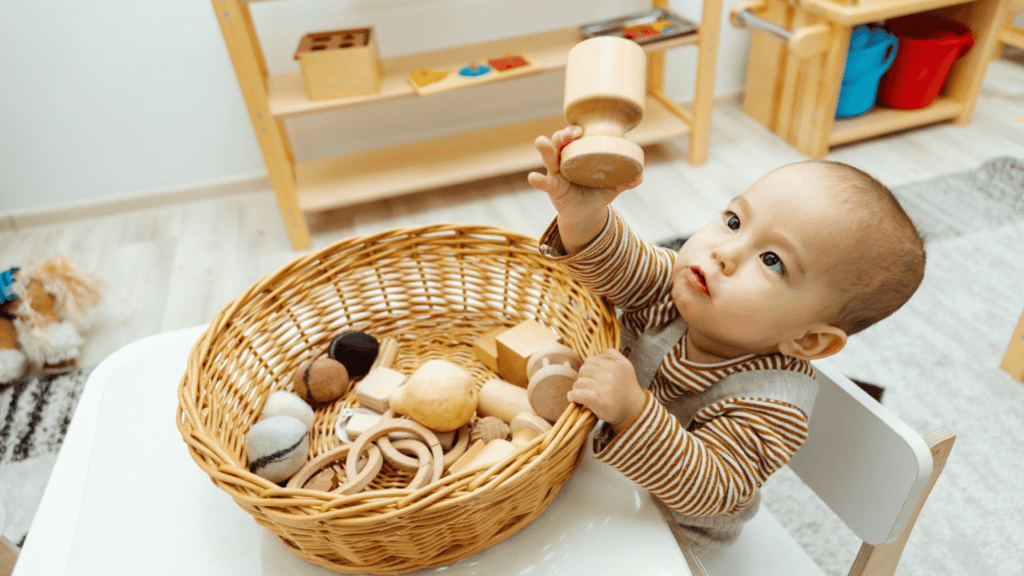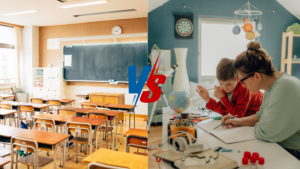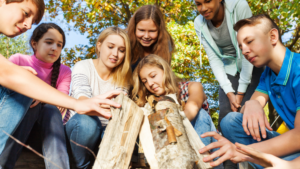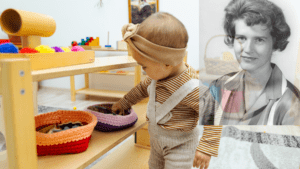Montessori education, founded by Dr. Maria Montessori, is known for its child-centred approach. This methodology fosters independence, self-discovery, and a love of learning from an early age. There are several thoughtfully created activities, tailored to a child’s developmental requirements in the Montessori educational philosophy.
Toddlers need a nurturing environment where they can discover their surroundings and gain confidence with key life skills. Let us explore the most common Montessori activities for toddlers. This includes practical life skills, sensory exploration, language development, mathematical ideas, fine and gross motor skills.
The Most Common Montessori Activities for Toddlers
The Montessori Method of education is carefully created to tap into a child’s natural curiosity and desire for autonomy, laying the groundwork for a lifetime of exploration and self-driven learning. Have a look at the common activities for toddlers.
Practical Life Activities
These are the day-to-day activities that adults perform in everyday life. Even though these activities frequently seem like a chore to us, children usually find these activities to be incredibly fun.
- Pouring water from one small pitcher to another can be a fun loving activity as children love playing with water. And what could be more fun to pour water from a jug to glass or small pitchers.
- Transferring objects with tongs or tweezers activity is a great way to get the child ready for making and serving food. Give the toddler a tong or tweezers and initially some big items to transfer from one bowl to another. Gradually the items to scoop up would become smaller.
- Using a child-sized broom and dustpan or to make a Swiffer suitable for children, remove the middle pole. Allow them to do floor mopping as often as they can.
- Encourage the toddler to assist with routine tasks like clearing the table, folding (simple) laundry, or clearing the dishes.
- Teach self-care techniques like hand washing, tooth brushing, and toilet use.
- Encourage independence by letting them choose their own clothes and best-effort their own attire.
- Use clothing with simple closures, such as snaps or Velcro, and teach them how to dress and undress themselves. Buttoning and unbuttoning clothes would also help them with their school uniforms.
- Provide a designated area where they can put their shoes, jackets, and backpacks, such as a low shelf or a cubby.
Sensorial Activities
A key element of Montessori education is sensory play. It is intended to stimulate a child’s senses and develop their capacity for discrimination and perception. These activities promote observation, comparison, and interpretation of the environment.
- Sorting objects by colour, shape, or size – Once you are done with shopping, allow the child to unpack the shopping bag and sort the objects based on shape, colour, or size. This would help parents to get the things sorted and the child would be able to distinguish varied things as per the appearance of the objects.
- Exploring various textures through a sensory bin (e.g., rice, beans, sand) – Create sensory bins with materials like rice, dried beans, sand, or water for tactile exploration. Add scoops, funnels, and containers for pouring and transferring.
- Playing with Montessori sensorial materials like the Pink Tower and the Brown Stairs promotes the sense of comparison and interpretation.
- Introduce sensory materials with different textures, scents, and colours, such as fabric scraps, spices, or scented playdough.
Fine & Gross Motor Activities
The development of children’s fine and gross motor skills is crucial for the development of their physical abilities and coordination. These activities have a long-lasting effect on a child’s capacity to carry out daily chores. The development of fine and gross motor skills fosters the child to participate in a variety of physical activities. These activities are essential for a child’s overall development.
- Peeling and cutting of vegetables or fruits – Fruits like banana, orange and vegetables like boiled potatoes are easy to peel. Give the child one fruit or vegetable and let them peel with their own capacity. This helps to develop their fine motor skills and develop a better ability to hold.
- Drawing and colouring – Give the child washable markers and they can draw their dreams on the walls. These can be though cleaned with a wet cloth. Wax crayons and coloured pencils for drawing and colouring promote the grip for fingers. This would later help them write easily.
- Offer materials for cutting and pasting, such as child-safe scissors and glue sticks. Use puzzles and threading activities to develop fine motor skills.
- Climbing on low, sturdy structures, balancing on a beam or line, rolling and catching balls and dancing or moving to music are few of the fun activities that develop the gross motor skills and toddlers enjoy these too.
Other Fun and Easy Activities
- Going on nature walks to observe and learn about the environment.
- Go for a nature walk with the toddler and allow them to do some gardening. A toddler should be encouraged to plant seeds and take care of them. Such activities foster the caring part of the child.
- Collecting leaves, rocks, or other natural items for exploration can also be done by the child.
- Reading books and pronouncing different words develop language skills in a toddler.
- Simple addition and subtraction using hands-on materials like spoons, forks, plates, vegetables, and even laundry clothes promotes number abilities.
- Surround your toddler with books and create cozy reading corners with cushions or small chairs.
- Read together daily, and encourage them to choose books and turn pages independently.
- Label objects around the house with simple words or pictures to support language development.
Final Words
The magnificence of Montessori activities lies in their adaptability, both in the classroom and at home. These activities encourage kids to explore, experiment, and learn about their surroundings. Such activities allow the child to work at their own pace, whether in a formal Montessori classroom or at home.
Montessori activities lay a strong foundation for lifelong learning, curiosity, and self-confidence. The Montessori Method respects a child’s innate curiosity and offers opportunities for hands-on learning. This methodology is a philosophy that values and cultivates each child’s unique potential, not just a set of activities.





This Post Has One Comment
This is an amazing page. The outstanding information reveals the owner’s accountability. I’m in awe and eagerly await more amazing postings like this one.